How to Get An HVAC License: State By State Requirements
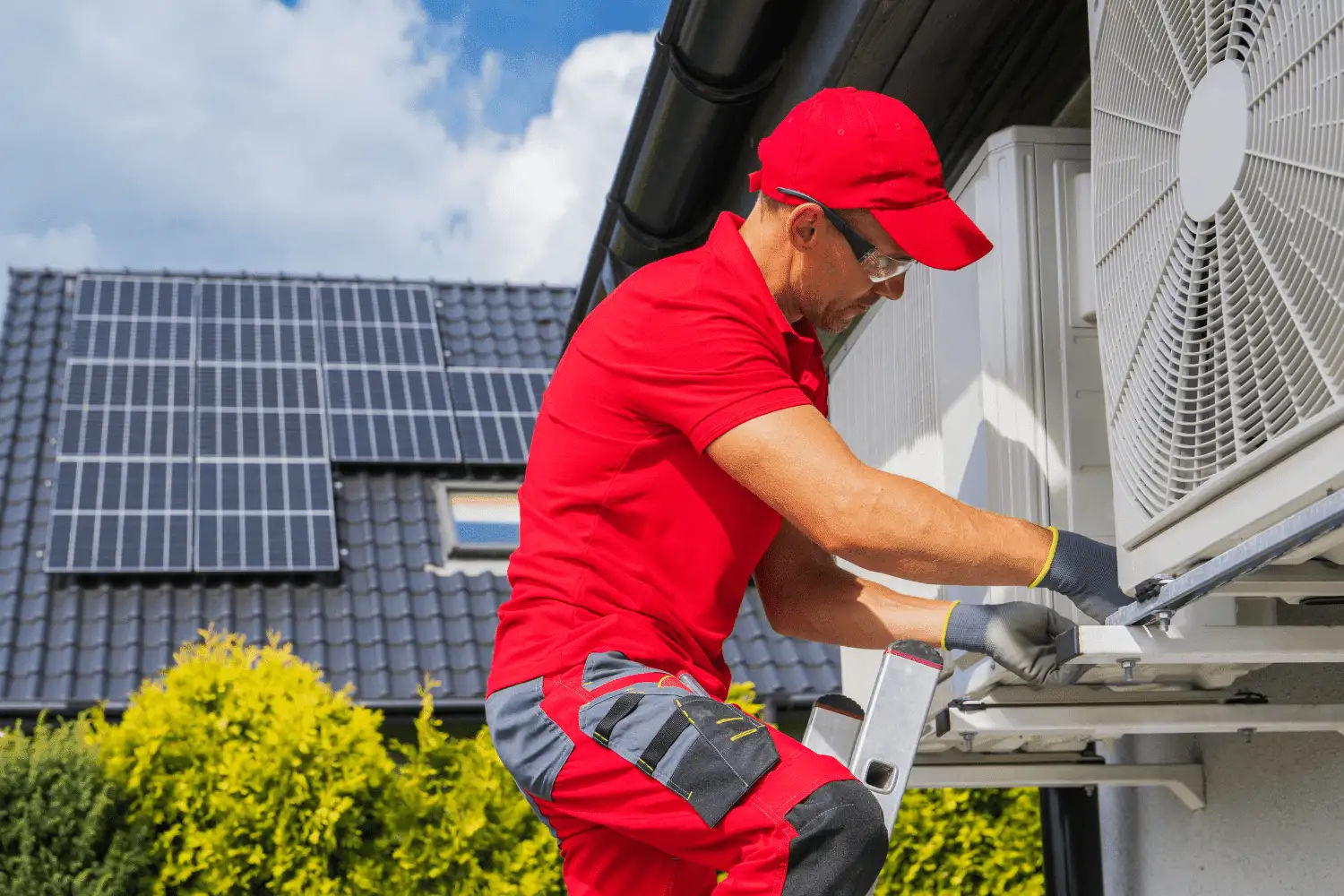
If you’re looking to get your HVAC license, you’ve made a good choice, as HVAC is in high demand in the U.S. The industry has been growing steadily and is expected to hit $82.5 billion by 2026. According to the U.S. Bureau of Labor Statistics, the industry is rapidly growing and is expected to grow 4% by 2029. As the industry grows, there will be a greater need for HVAC contractors (sometimes referred to as HVAC technicians), meaning joining the industry will be a solid career move.. But before you can start making the indoor temperature a perfect 72 degrees for your customers, you have to snag an HVAC license.
HVAC has really become a high-tech industry that also requires a knowledge of plumbing, electrical, sheet metal/ductwork and the laws and codes regulating all of these areas. It’s in everyone’s best interest to make sure that professionals doing this work are skilled and knowledgeable.
Ready to get started with Field Promax?
Sign Up FreeGetting your HVAC certification is an important part of growing your HVAC career. HVAC contractors make an average of $49,535 per year. As you increase your license level, you also increase your salary potential. On average, after HVAC contractors add three years of experience under their belt, they see a yearly pay increase of 22%. Regardless of your level, having your HVAC license can be a huge advantage to you as an HVAC contractor, especially if you want to level up your skills and really master your craft.
An HVAC license grants technicians the ability to install, repair, and maintain HVAC systems. It sets a standard for the industry’s safety, professionalism, and quality. With this certification, technicians can complete work such as:
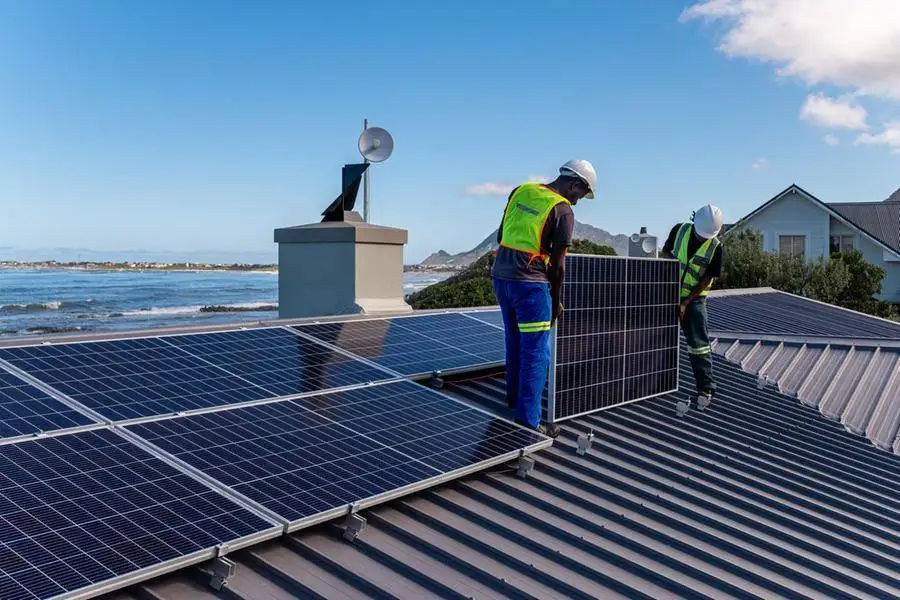
- Installing HVAC systems in commercial or residential properties
- Cleaning and replacing air filters
- Installing solar panels, thermostats, and humidistats
- Inspecting piping systems for leakages
- Troubleshooting HVAC system issues
- Inspecting and cleaning duct systems
Want a personalized demo?
See how Field Promax can transform your field operations
Not only is an HVAC license required in most states, but it also demonstrates an individual is trained and qualified to conduct installation and repair work. In many U.S. states, getting certified is a necessity in order to start an HVAC business or work in the field.
Many states offer different types of HVAC licenses that dictate the type of work you’re allowed to complete, the projects you’re allowed to work on, and the level of supervision required when working. Naturally, there might be different requirements for you to work in HVAC, run your HVAC business, or be considered a professional HVAC contractor depending on your state, . Therefore, it could be confusing and cumbersome for some people, especially if you are new to the industry.
To help you with this task, we have carefully researched how to get an HVAC license in the United States of America. Most states follow a general guideline. The criteria include:
1. General Requirements

- You need to be 18 years old or older.
- You must have a clean criminal record with no felonies.
- You will need a high school diploma, GED, or bachelor’s degree (for the highest level of mastery in some states). Also, there will be a combination of on-the-job training and formal HVAC training programs from trade school, community college, or even university programs. (Since experience requirements may be listed in hours, please note that 2,000 hours is roughly equal to one year of 40-hour work weeks)
- The Environmental Protection Agency (EPA) requires all HVAC technicians to take a one-time exam for handling refrigerant regardless of state. Once you complete the test, you earn an EPA Section 608 certification.
Some states, however, impose some additional requirements to give you an HVAC license. Below you will find the specific HVAC license requirements by state.
2. HVAC License Florida
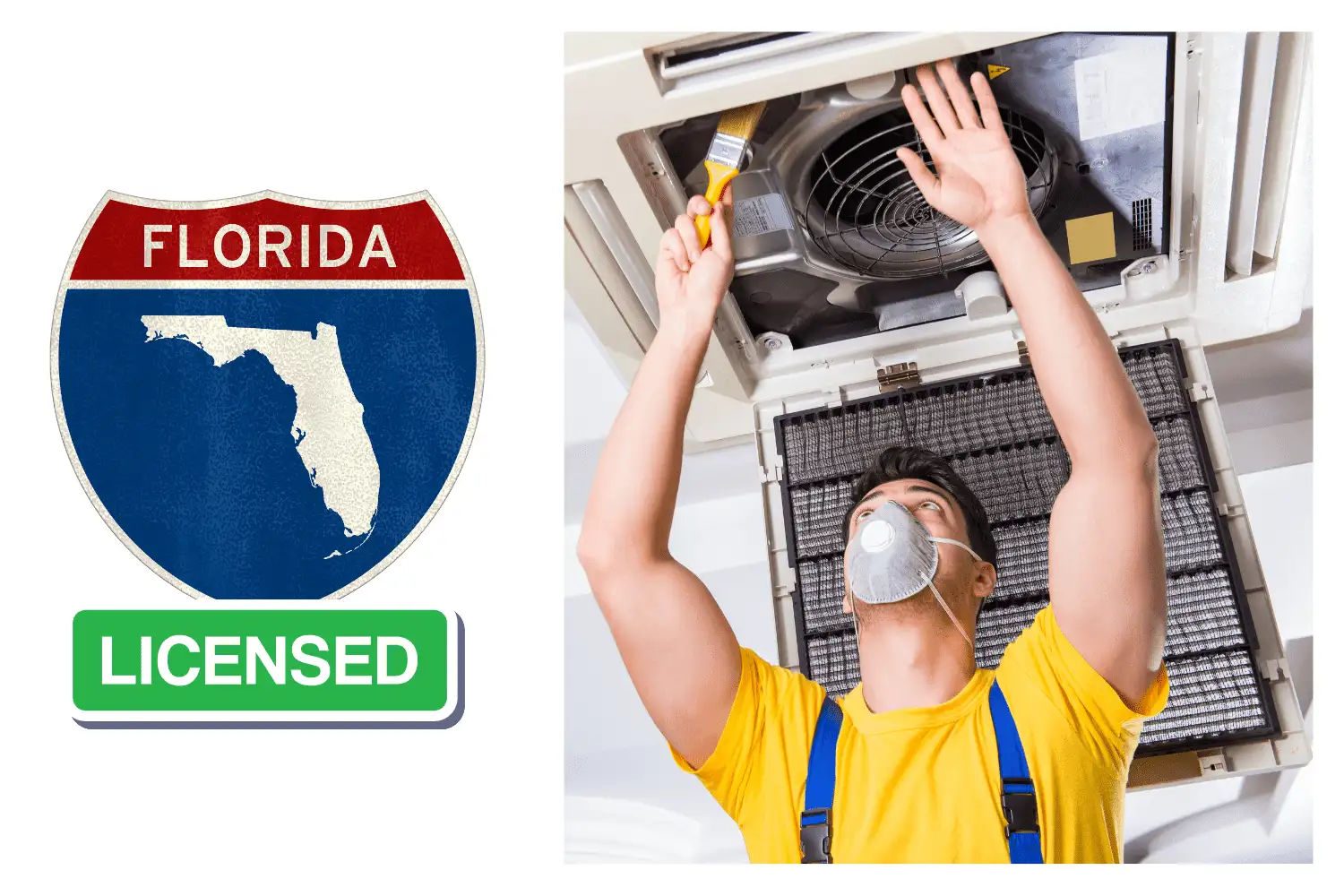
If you are looking for a Florida HVAC Florida license, first determine what kind of license you need. The state of Florida provides four different types of HVAC licenses,namely,
- Class A State Certified Contractor: Allows you to work on any size unit.
- Class B State Certified Contractor: Allows you to only work on units of 25 tons of cooling or less and 500,000 BTU of heating.
- Class A State Registered Contractor: Let technicians work on cooling systems of less than 20 tons and heating systems lower than 500,000 BTU.
- Class B State Registered Contractor: can only work in specific local areas on systems under 20 tons or less than 500,000 BTU.
Note that Class C State Certified and Registered FL HVAC licenses are no longer offered but are still recognized by the state for those contractors who held them prior to October 1, 1988.
Other than these HVAC license Florida, you can also apply for a NATE certification. This is a voluntary certification offered by the North American Technician Excellence organization. It shows employers you possess additional knowledge in the industry.
3. North Carolina HVAC License
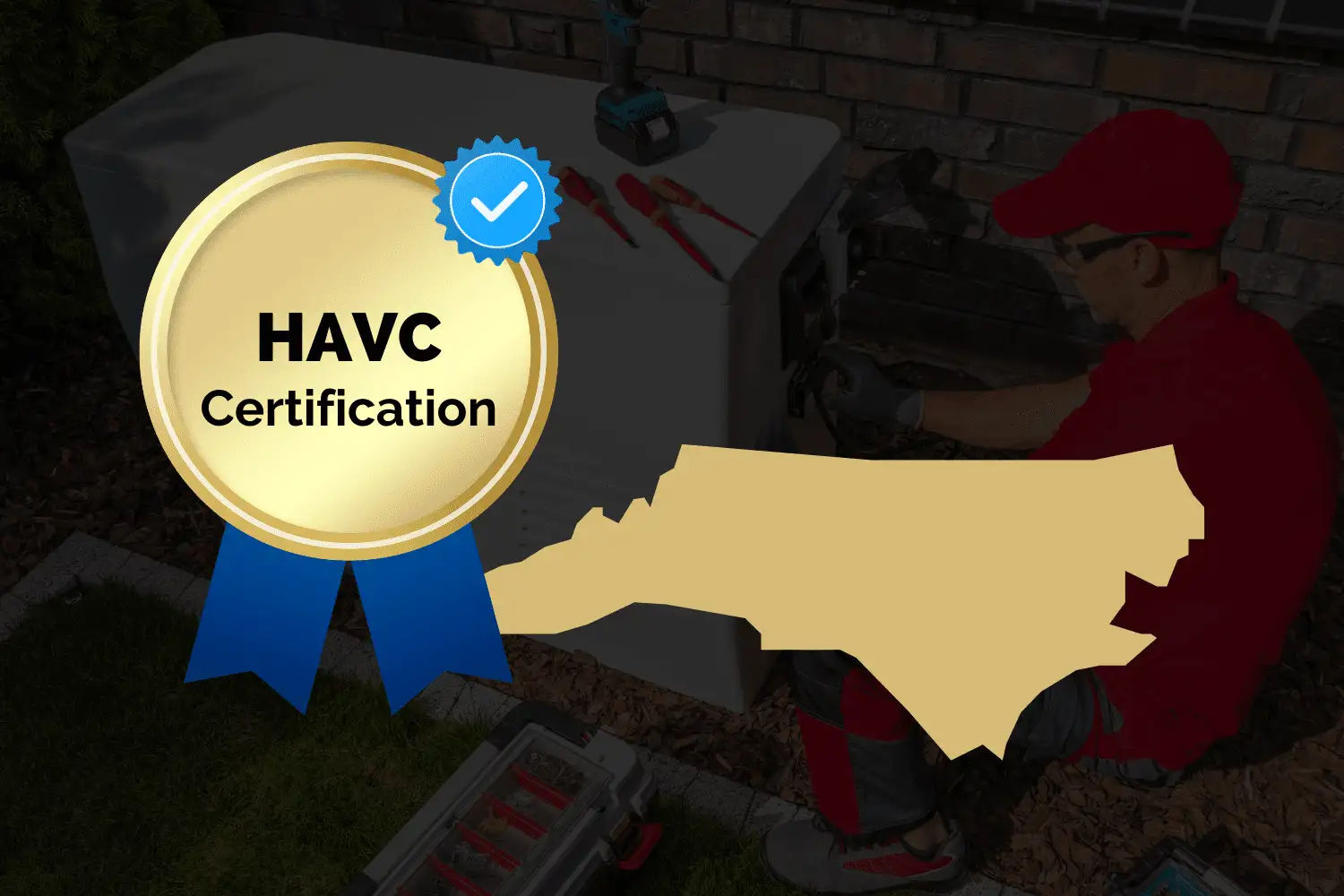
Unlike Florida, North Carolina offers two types of HVAC certifications, namely, heating and cooling contractor licenses and refrigeration contractor licenses.
Heating and cooling contractor license
Contractors who work on heating and cooling systems need this type of license. Depending on the systems you work with, you’ll need to choose one of these three NC HVAC license groups:
- H1: For any type of water-based heating system
- H2: For forced-air heating/cooling systems with a cooling capacity of more than 15 tons
- H3: For forced-air heating/cooling systems with a cooling capacity of 15 tons or less
Refrigeration contractor license
According to the North Carolina State Board of Refrigeration Contractors, anyone who performs the “installation, maintenanc servicing, and repairing of refrigeration machinery, equipment, devices, and components” must have an active refrigeration contractor license.
There are four classes for this type of license:
- Class I: For commercial refrigeration contracting
- Class II: For industrial refrigeration contracting
- Class III: For refrigeration service contracting
- Class IV: For transport refrigeration contracting
You’ll need a class I contractor license in any of the above groups to work in residential, commercial, or industrial buildings. Class II licenses are for single-family residences only. Class T is reserved for HVAC technician licenses.
4. Texas HVAC License
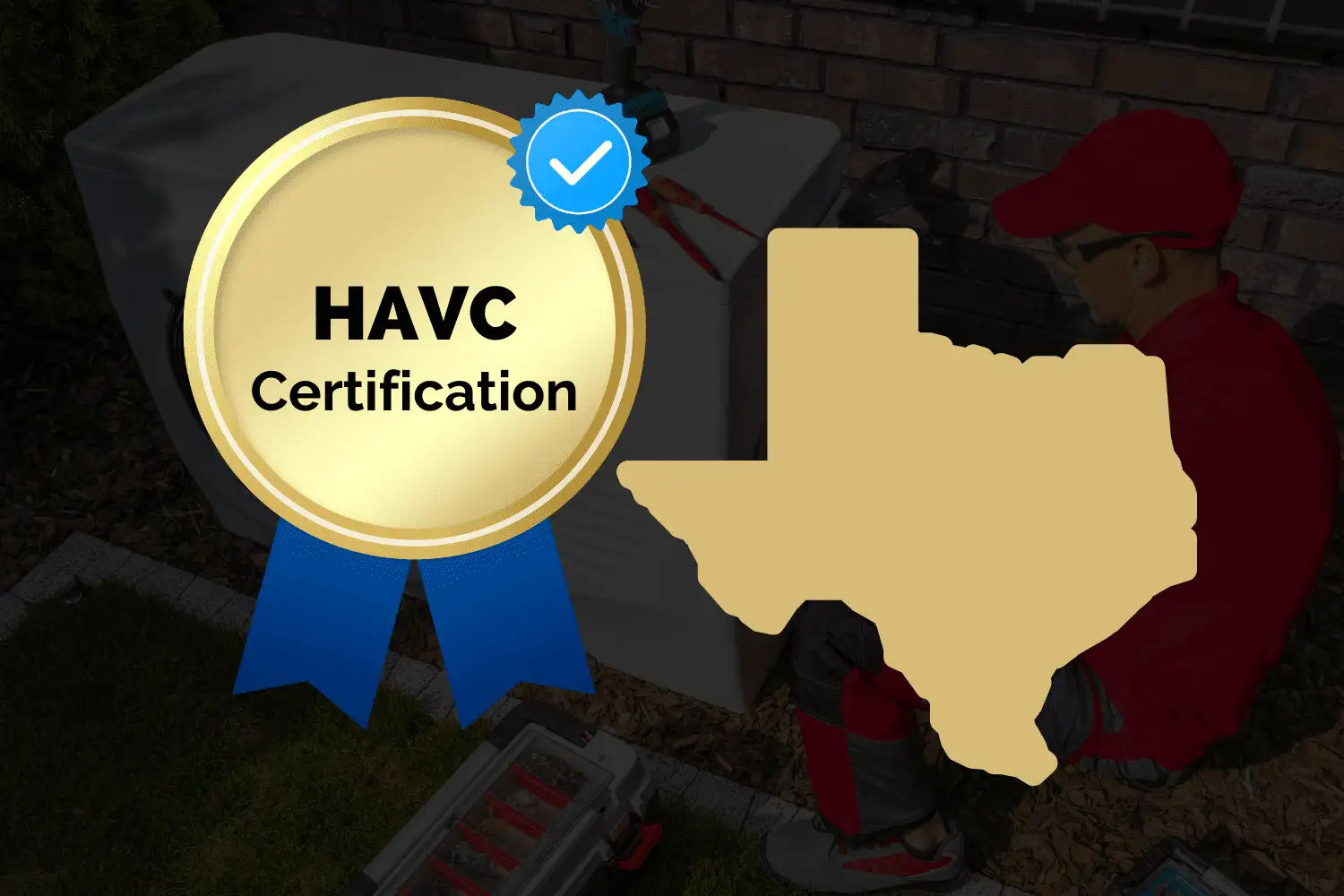
Next, let’s move on to how to get an HVAC license in Texas. The Lone Star State offers three types of HVAC licenses:
Texas registered technician
The registered technician license allows you to assist a licensed HVAC contractor in performing repair work. To qualify, you must be at least 18 years old, complete an application, and submit a $20 application fee. No experience or education is required, but you can only work under the guidance of a licensed HVAC contractor.
Texas certified technician
The certified technician license demonstrates that you meet higher standards of experience and education than a registered technician. However, you still must work under the supervision of a licensed air conditioning and refrigeration contractor. You also can’t advertise your air conditioning and refrigeration services.
To become a certified technician, you must be at least 18 years old, complete an application, and submit a $50 application fee.
Additionally, you must meet one of the following requirements:
- Have two years of experience working under a licensed HVAC contractor
- Complete a TDLR-approved HVAC certification training program consisting of 2,000 hours of combined instruction and practical experience within the past four years.
- Military experience can also count toward the experience requirement. After submitting your application and meeting the requirements, you’ll need to take and pass an HVAC licensing exam to become fully certified.
Texas HVAC contractors’ license
HVAC professionals who plan to provide air conditioning and refrigeration services independently must hold an HVAC contractor’s license in Texas.
There are two types of HVAC contractor licenses in Texas. A Class A contractor’s license allows you to work on any size unit. A Class B contractor’s license allows you to work on cooling systems of no more than 25 tons and heating systems of 1.5 million BTUs per hour or less.
Before being allowed to earn your contractor’s license, you must first be a registered technician working under a licensed contractor. From there, you can decide to become a Certified Technician. That’s a voluntary qualification that exceeds the standards of a Registered Technician.
5. HVAC License California
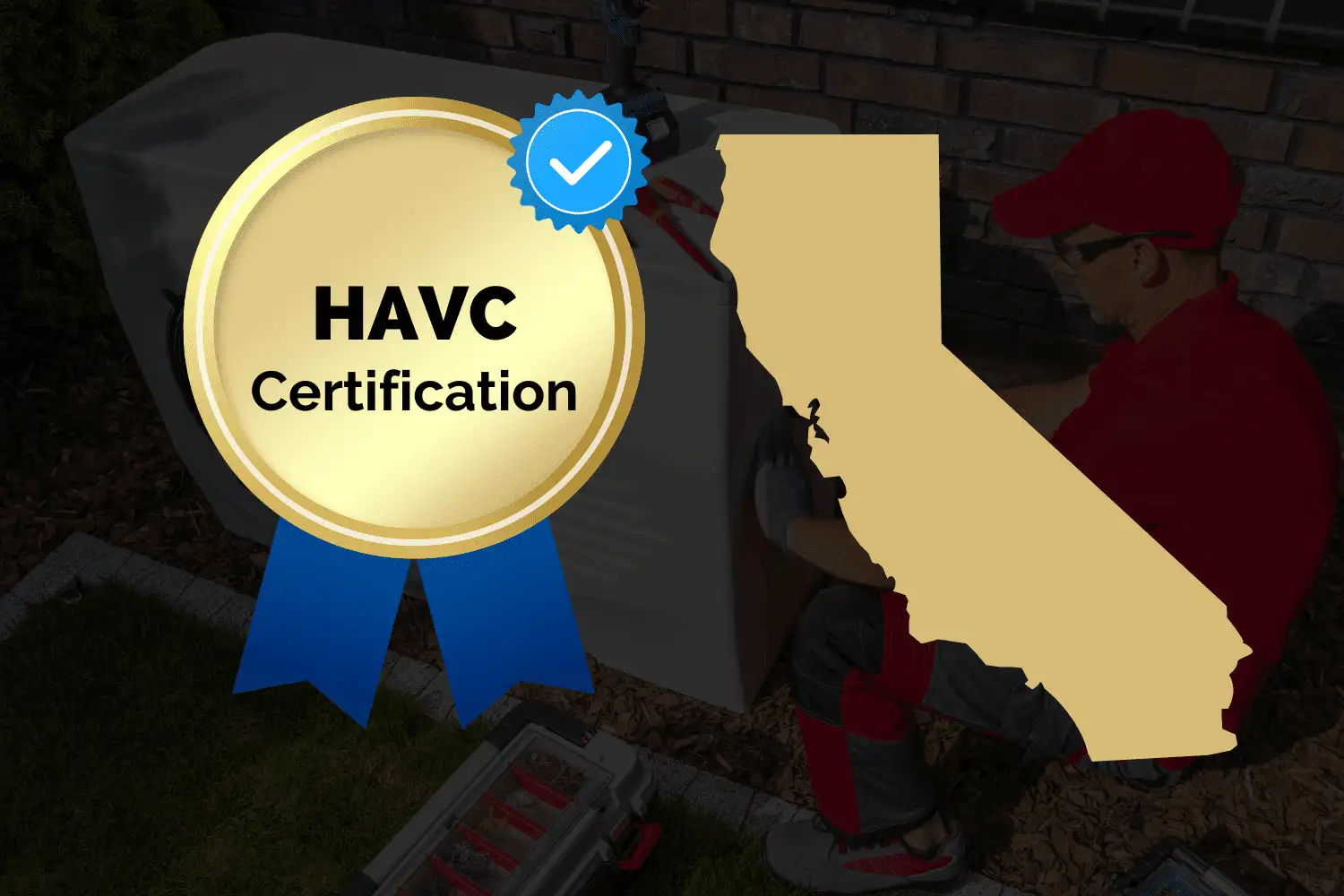
An HVAC license is a classification of an Original Contractors License in California. It is a Class C Specialty Contractor License, specifically C-20—Warm-Air Heating, Ventilating, and Air-Conditioning Contractor.
The Department of Consumer Affairs Contractors State License Board licenses HVAC contractors in California. Any work worth more than $500 requires a C-20 HVAC license California. You must have pre-authorization from the state and pass both the trade and law and business exams to take the test. You must have at least 4 years of experience in the preceding 10 years to be eligible to take the test. A $15,000 bond and evidence of worker’s compensation insurance are needed.
6. HVAC License New Jersey
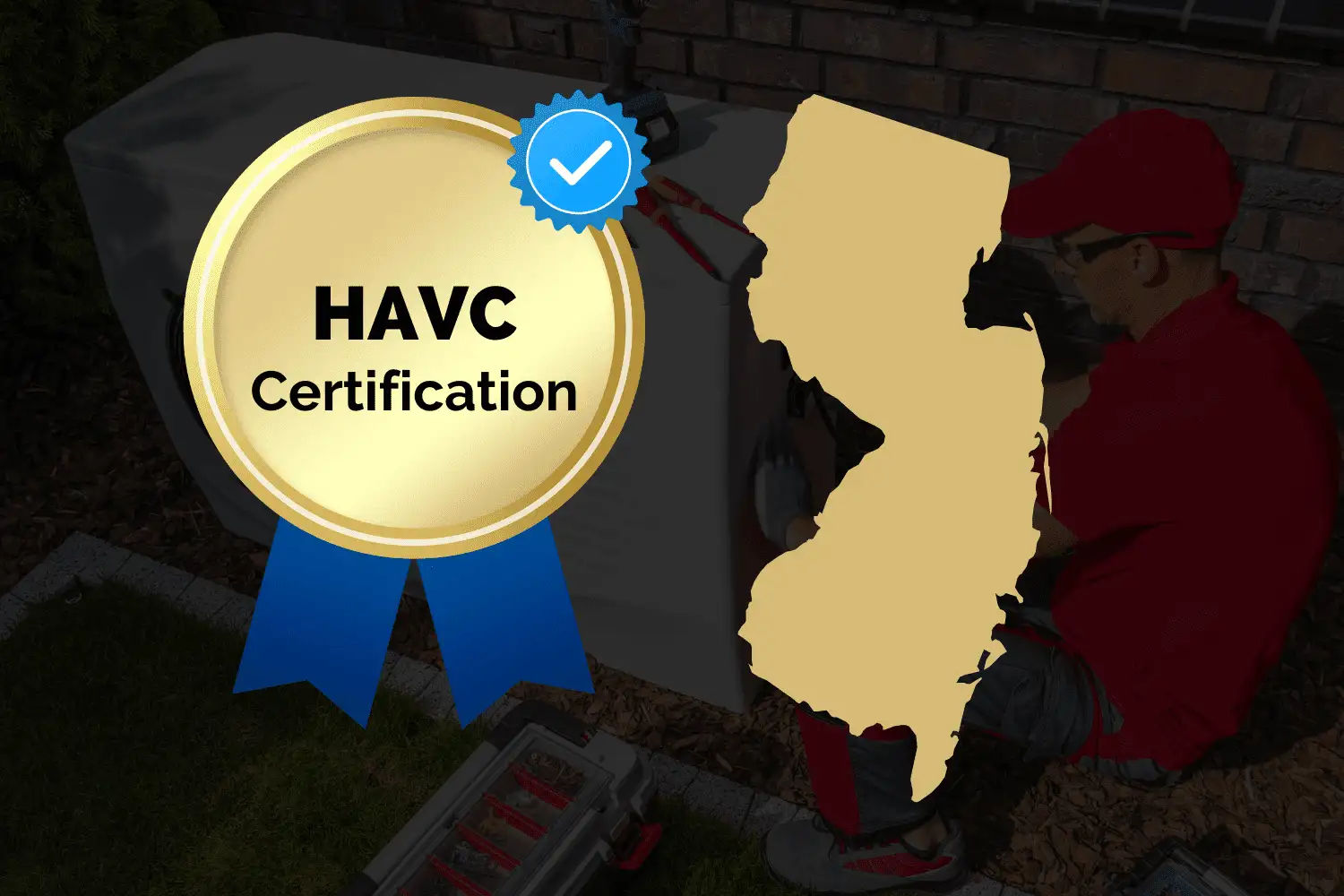
One must possess a New Jersey master HVAC contractor license or be training under the direct supervision of someone who does hold a New Jersey HVAC license to legally perform any HVAC services in the state.
The New Jersey State Board of Examiners of Heating, Ventilating, Air Conditioning, and Refrigeration Contractors licenses HVAC contractors. You’ll need a bachelor’s degree in HVACR and 1 year of experience, a bachelor’s degree in a related field with 3 years of experience, a completed vocational or trade program and 2 years of experience, or 4 years as an HVAC apprentice with 1 year of experience. In addition, the state requires liability insurance and a $3,000 surety bond.
7. Rhodes Island HVAC License

Rhode Island uses the apprentice-journeyman-master model for HVAC contractors, as shown below.
- Apprentice: Requires 4,000 hours (2 years) of paid on-the-job training and 144 of HVAC schooling per year.
- Journeyperson Class II (Limited): Requires 4,000 hours (2 years) of paid on-the-job training and 288 hours of HVAC schooling.
- Journeyperson Class I: Requires 10,000 hours (5 years) paid on-the-job training with 144 hours of HVAC schooling OR 6,000 hours (3 years) paid on-the-job training and 432 hours of HVAC schooling.
- Contractor Master II (Limited): Requires 3 years experience as Journeyperson Class II.
- Contractor Master I: Requires 1 year of experience as Journeyperson Class I OR Contractor Master II.
- Contractor Master (Limited): Requires a BS degree in mechanical engineering and 4 years of refrigeration or pipefitting experience; or a BS in business administration and 4 years of refrigeration or pipefitting experience.
- Master Mechanical Contractor: Requires 20 years experience with 10 as a pipefitter Master I and 10 years as a Master I. For the “Limited” designations, commercial and residential heating installations are set to 500,000 BTUs or less.
8. HVAC Certification Cost
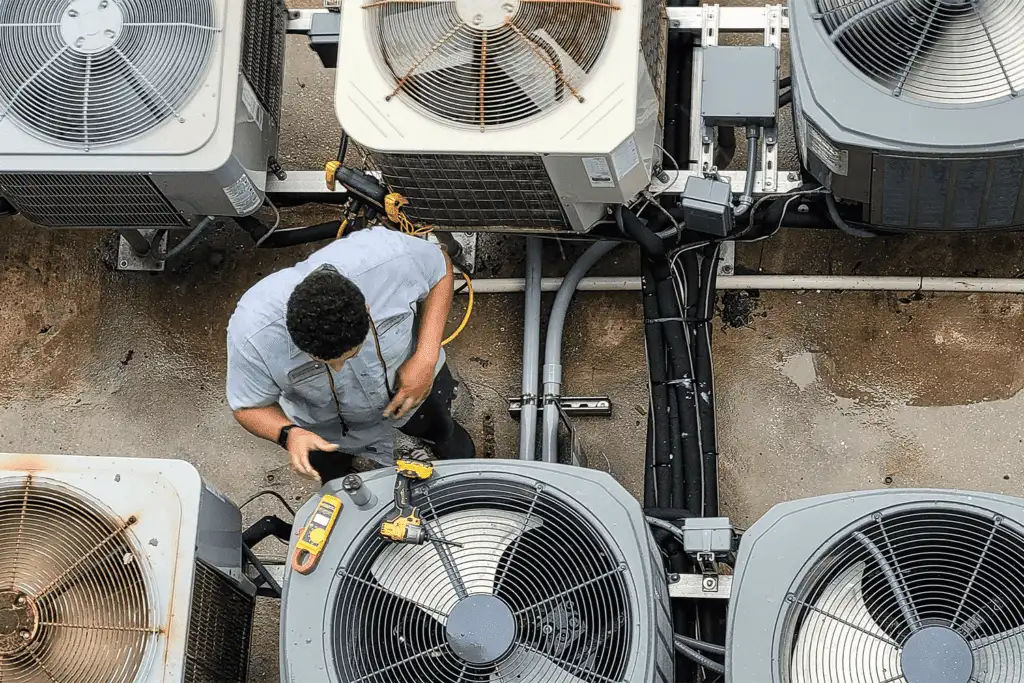
Depending on the state or granting organization, the cost of getting your HVAC license or certification may vary. Most of the time, the overall cost will range from a few hundred to a few thousand dollars. Standard expenses can include course registration fees, coursework and materials, examination fees, renewal fees, and possible reinstatement fees if your certification lapses or expires. You can also apply for your HVAC license online.
9. Difference Between HVAC License and HVAC Business License
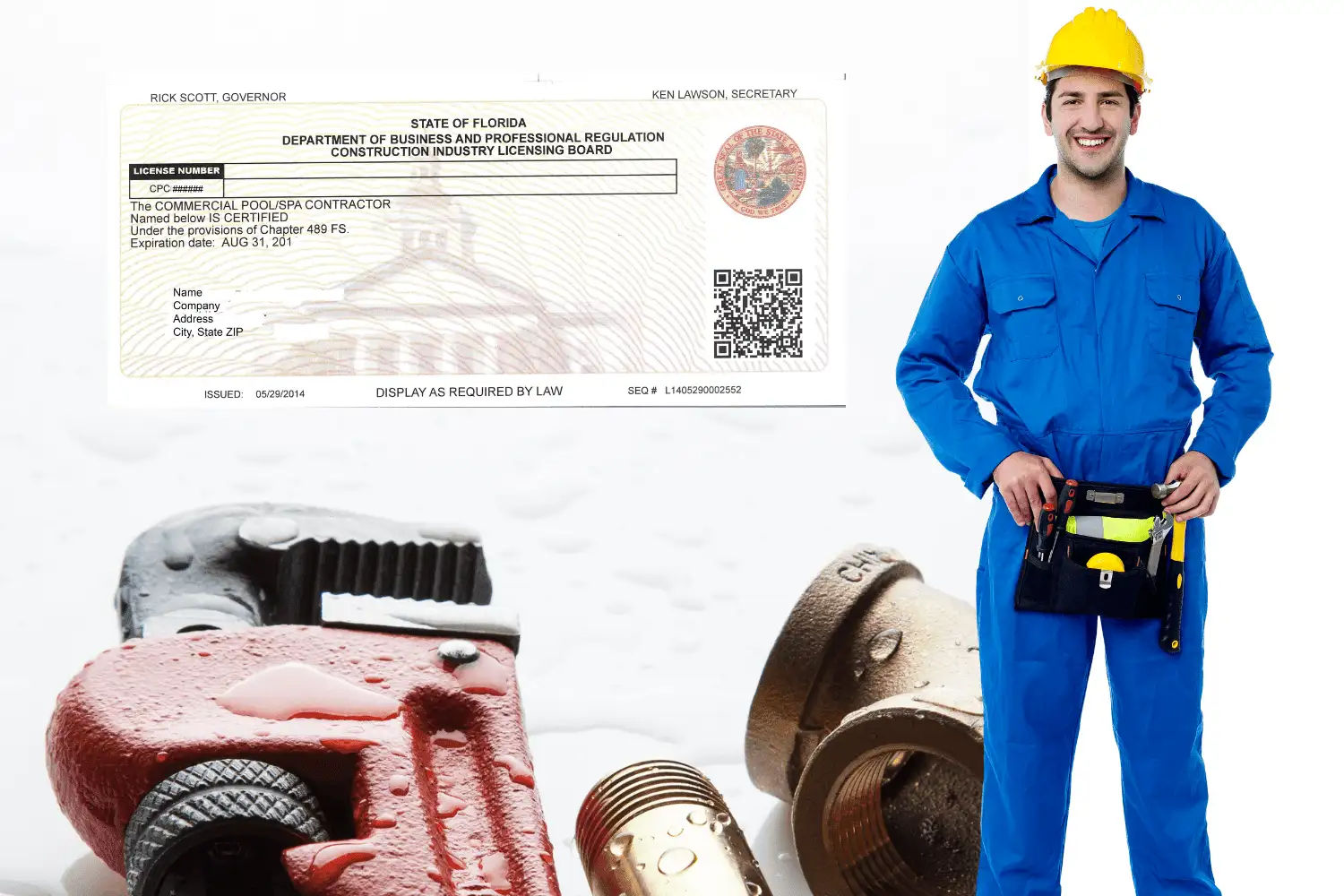
A business license is granted by government bodies that enable people or companies to conduct profit-generating activities within a geographical jurisdiction. It is the local government’s permission to set up a company. On the other hand, an HVAC certification proves that you have the necessary skills and training in your field.
Because a person obtains his HVAC license after completing his training program and earning his certification or degree, it’s a kind of post-graduate education. While this may seem like an unnecessary extra step, it is essential to note that most states require applicants to pass the license test before working independently in the sector to guarantee competence. Altogether, you may need an HVAC certification, HVAC license, and business license, although certification and licensing can be two separate things or interchangeable based on your state.
Wrapping Up

Getting the most out of an HVAC technician, no matter where they are in their licensing journey, takes work. Field Promax’s cloud-based, all-in-one HVAC software gives technicians and business owners the technology they need to do the work efficiently and the data they need to do it smartly.
With this cutting edge digital technology, HVAC business owners can easily manage their operations, be it from the office or in the field. It is the ideal tool to automate and streamline your business processes and add more efficiency to your workforce. For example, using Field Promax, one can easily schedule and dispatch technicians, manage new and repeat work orders, track employee time and productivity, manage inventory and equipment, track staff location in real time with GPS technology, create estimates and invoices, share necessary customer information and work order details with field technicians via an integrated mobile app, and much more.
For more information, contact Field Promax
We're here to help you get started